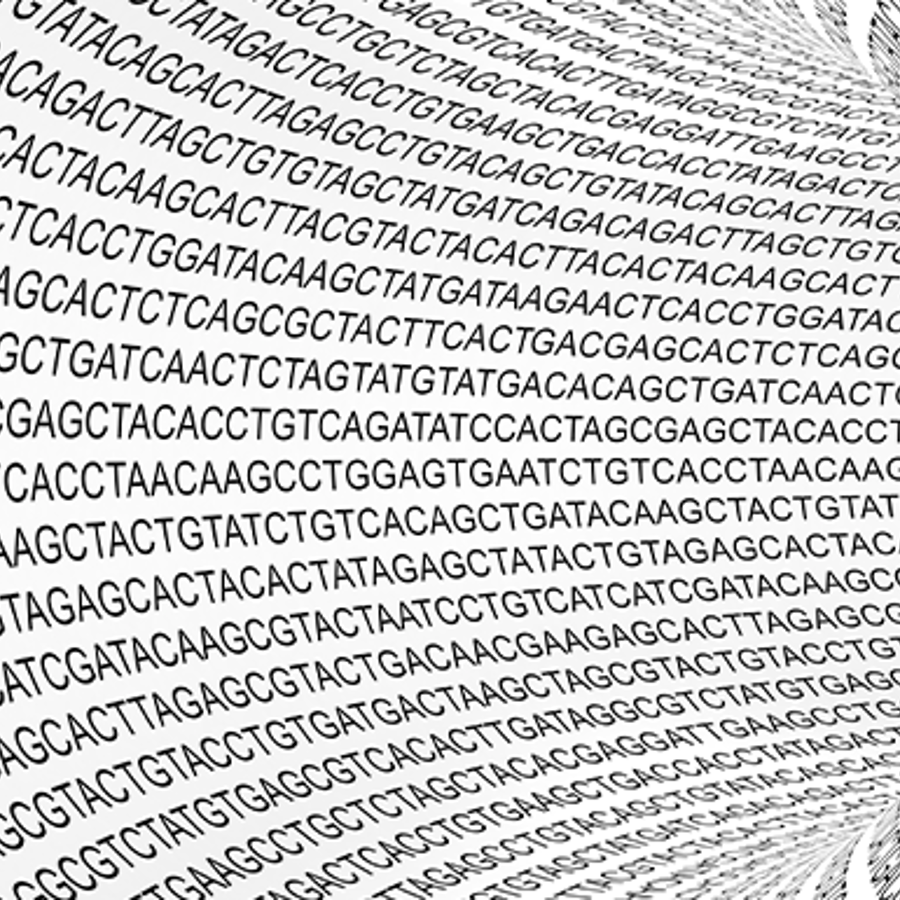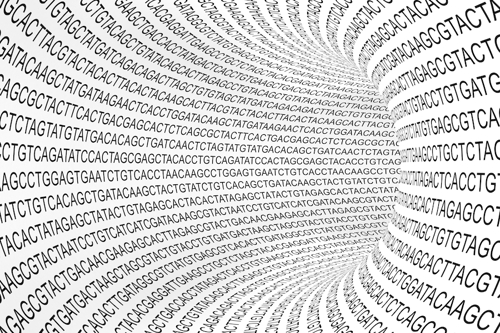
Is it worthwhile to get my own full genome done (since it’s only around $2000 these days)?
April 30, 2013

- Related Topics:
- Common questions,
- Consumer genetic testing,
- DNA sequencing,
- Genetic testing,
- Editor's choice,
- Cystic fibrosis,
- Genomics,
- Biotechnology
An undergraduate from Ukraine asks:
"Is it worthwhile to get my own full genome done (since it’s only around $2000 these days)?"
This is a tough question to answer because the decision is such a personal one. What I can say is you probably won’t learn as much as you would think. This is because there is a lot about human genetics that is still being learned.
You see, right now the technology is really good at reading DNA letter-by-letter. What we still have to learn is how to better interpret what the technology lets us see.
So, if you get your full genome sequenced, you will get the long string of letters that makes you unique. What you won’t get is a full explanation of what most of it means.
You will have some differences in your genes that no one else has. This could mean that no one will know what the differences mean or what they do to your genes, if anything at all. And this is only part of the problem.
You could also find differences that we know can affect a person’s health. Unfortunately, there won’t be anything you can do about many of these differences either.
Now you can start to see why I said this kind of decision is personal. It depends on what you want to get out of having your DNA read. It also depends on what type of personality you have.
If you are someone who worries, having lots of information could make you worry more. This could be worse when the information is not clear and if there is nothing that can be done about it.
For example, you might find that you have a difference in your DNA that makes you more likely to get Alzheimer’s disease. You would know you have a higher risk, but there would be very little you could do about it. We can’t change our DNA and in some cases knowing our health risks won’t prevent problems from happening. And this is just one example.
In addition, the test will miss things too. There are parts of our genes where it is hard to read the letters and other parts that sequencing will miss or get wrong.
So you may learn a lot about your DNA by getting it sequenced, but you will not get a full picture. And what you do learn may or may not be useful for you to know. It depends on what differences are found and if we know what they mean or not.
If you’re interested in figuring out your risk for certain diseases, family history is still the best tool to use. If something runs in your family, you may have a higher chance for getting that health problem or passing it down to your children than someone else.
If there are health problems running in you or your family, you should see a genetic counselor. A genetic counselor might be able to help find an explanation for the health problems and also predict risks for you and your family members.
To show you what we’re up against, I will use cystic fibrosis as an example. This is a well understood genetic disease, and it is caused by certain versions of one gene called CFTR.
As you’ll see, even with this “simple” situation, reading the CFTR gene can cause more confusion than you might think. Adding the rest of our genes and more complicated diseases makes things even more baffling.

Cystic Fibrosis as an Example
Your genome is the complete set of instructions your body follows to make you. These instructions are found in your genes, and genes are made up of DNA. And as I said before, DNA is a code made up of a string of letters.
As humans, we all have the same genes in our genome. We each have two copies of each gene—one from our mom and one from our dad. That’s why we are a little bit like our relatives, but no one is exactly alike. Everyone’s DNA is a little different or unique.
It turns out, we have about 25,000 genes! However, since everyone’s DNA is a little bit different, it means we may have unique versions of some of these genes in our bodies.
This translates to each of us having thousands of tiny differences in our genes. But don’t worry! Most of the time, these tiny spelling differences are not harmful and do not cause health problems. They are what make us who we are.
So, for any given gene, your version of that gene may be slightly different from someone else’s. And when you get your DNA sequenced, you will get all the letters that spell out both copies of your 25,000 genes. (In addition, if you get your whole genome sequenced you’ll get the letters from the 98% of your DNA that isn’t genes but we won’t focus on that here.)
After sequencing, you need to interpret what all those letters in all those genes mean. Easier said than done. To show how tricky this all is, we’ll start off by focusing on a single gene, CFTR.
Just like we all have the same genes and two copies of every gene, we all have two copies of the CFTR gene as well. We know a lot about CFTR. We know what it does in our bodies, and we know many of the versions of it that can cause cystic fibrosis. But we don’t know everything.

Cystic fibrosis is a chronic disease that causes extremely thick mucus in the body that affects the lungs. It is a life threatening disease. To be born with cystic fibrosis, both copies of the person’s CFTR gene are versions that do not work properly because of the differences in the letter codes.
When a person has one copy of the CFTR gene that can’t work properly, they do NOT have cystic fibrosis. These people are called carriers. Carriers of cystic fibrosis will never have the disease because their back up copy is working just fine.
If you are an adult, you probably aren’t getting your DNA sequenced to check to see if you have cystic fibrosis. Since cystic fibrosis is usually a very severe disease, people who have it usually know by the time they are adults if not earlier during childhood.
The information you’d most likely want is whether or not you are a carrier of cystic fibrosis. Many people want to know if they are carriers for genetic diseases like cystic fibrosis when they are thinking about having children. This is because if both partners in a couple are carriers of cystic fibrosis, there is a 25% chance to have a baby with the disease.
As we read more and more people’s genomes, we might find more and more differences in the CFTR gene. So far almost 2,000 versions of this gene have been found. We don’t know how many of them work in the body or if they could cause cystic fibrosis.
Imagine you have your genome sequenced and find a difference in one of your CFTR genes that hasn’t been seen before. Now what? Does this mean you are a carrier of cystic fibrosis? Could you have a child with cystic fibrosis?

Right now, we would use our tools and what we know about genetics to make our best prediction. But the truth is, we couldn’t be sure unless someone who has cystic fibrosis is found to have that same version of the gene in their body. This would be helpful in the future, but not in the here and now. We simply don’t have all the answers yet.
And that is only the CFTR gene. Now multiply this kind of uncertain result by 25,000 genes! Oh, and don’t forget that most genes are not understood as well as the CFTR gene.
This is the reality of having your genome sequenced at this point in time. It is easy to read our genes, but it is still hard to understand what we find. This is especially true when a person is healthy and has no health problems that might be explained by differences in their genes. You might find that your genes have all sorts of differences in them, but you may never know what those differences mean for you or your family members or if they mean nothing at all!
Making the Decision
Any time someone has genetic testing, there is a possibility they will discover something about themselves that they didn’t expect. For example, they may discover that they have a higher chance to develop a certain disease or to pass a genetic disease on to their children.
This can be difficult for some people to deal with, especially if there is no way to fix the health problem or prevent it from happening. Some people can become stressed or worried when they learn about their genes, particularly when the results are unclear.
Since this type of genetic testing is available, it is up to each person to decide if they want to have it or not. Different people find value in different things, and everyone has the option to choose.
Meeting with a genetic counselor or another genetics specialist can be an important part of this process. They teach people about genetic testing, help people decide if they want to do it or not, and also help figure out what the results mean.
I would encourage anyone who is considering getting whole genome sequencing to think long and hard about all the things that could possibly come up. How would it feel to get unexpected results? Would you be able to deal with uncertain results? This is important to think about to make sure that you are making the best decision for yourself.

Read More:
- Why doctors may be overwhelmed soon by too much genetic data
- How hard it can be to tease information out of a genome
- What a visit to a genetic counselor might be like
- More on genetic counseling
- To find a genetic counselor in your area, use the ‘Find a Genetic Counselor’ tool found on the National Society of Genetic Counselors (NSGC) website

Author: Adrienne Miller
When this answer was published in 2013, Adrienne was a student in the Stanford MS Program in Human Genetics and Genetic Counseling. Adrienne wrote this answer while participating in the Stanford at The Tech program.
 Skip Navigation
Skip Navigation
